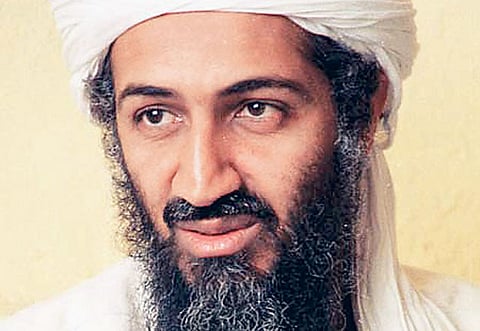Few options before Pakistan
Kuldip Nayar writes: Not many are willing to trust Islamabad that it was unaware Bin Laden lived in the heart of the nation

Islamabad is damned both ways: whether it admits to its hand in the US operation which killed Osama Bin Laden or it says that it did not know that he was living at Abbottabad, close to Pakistan's military academy. The first option may evoke an anti-Pakistan storm within and outside the country because Bin Laden had come to represent anti-American sentiment among most Muslims. At present, people's mood is sullen but not evocative.
The second option will be taken with a pinch of salt. Not many are willing to trust Islamabad that it was not aware of Bin Laden and his family living in a mansion in the heart of Pakistan for the last five years. America's anti-terrorism chief has already asked Pakistan to prove that it did not know of Bin Laden's whereabouts.
For the world, it is a serious matter which Islamabad must attend to in a serious manner. It would be difficult to sell what Pakistan's envoy to the US has said: Pakistan is making inquiries how Bin Laden came to Abbottabad and lived without the authorities knowing it. Different voices from different places to explain may not do. Without a valid explanation, Pakistan would find itself in a tighter position as the days go by.
One allegation is that the Inter-Services Intelligence (ISI) had built the huge mansion for him. It must be very large because four US helicopters ultimately landed in the compound. But whoever built Bin Laden's residence, the fact of its existence cannot be denied.
True, Pakistan's sovereignty has been violated as former president General Pervez Musharraf has said. But the four helicopters which conducted the operation may have flown in from Gazi, the Pakistan territory where the US has an airbase. Islamabad should not have allowed the Americans to enter from day one. My fear is that much more trouble is in store for Pakistan because Washington is determined to use it for its war in Afghanistan. Whatever the rhetoric, I do not buy the argument that Pakistan knew about the operation.
Not kept in the loop
A couple of times the US had pinpointed Bin Laden's hideout and communicated to Islamabad before carrying out the operation. But all the times it turned out that Bin Laden had left the hideout at the eleventh hour. The US State Department has openly said that Pakistan was not kept in the ‘loop.' It was entirely a US operation from the beginning till the end.
Pakistan may feel embarrassed over the statements by some top military echelons and former retired Foreign Service hands. One Air Marshall has said on one Indian TV network that Islamabad supported the US operation, but did not want to admit it because they were still in the midst of a war against the Al Qaida. A Foreign Service hand said that they wanted to punish the extremists who have killed thousands. Therefore, according to him, Pakistan was justified in letting the US operation to take place without any challenge.
Washington may gloat over the elimination of Bin Laden. US Secretary of State Hillary Clinton said, "This is America and what it decides it carries out." She should realise that Bin Laden emerged because he was able to harness the hurt of Muslims who have felt America's interference in their internal affairs.
Terrorism, they generally believe, is the term that has been tagged to them to give them a bad name. America and the West have to seriously consider how to allay their fears. President Barack Obama tried to reach out to Muslims at Cairo but the words he used have turned out to be empty. Muslims expect him to give a concrete shape to the sentiments he had expressed to prove his credibility. When America emerged victorious in the cold war after defeating the Soviet Union in Afghanistan, the West believed that it had ended the ideology of communism. But this is not true because the expressions against globalisation may not have got coherence and the channel to ventilate them.
Similarly, Al Qaida may end but as an ideology it will resurface in some other shape in some other countries. In fact, the Lashkar-e-Taiba is an offshoot of the Al Qaida philosophy. The root cause is the grievance. Unless that is tackled, the fertile ground for any group or a bunch of people to come up and disturb the peace will always be there.
India's response was along the expected lines. Prime Minister Manmohan Singh said that the whole incident proved that Pakistan was a haven for terrorists. He termed Bin Laden's death a ‘significant step forward' and hoped that it would deal decisive blow to the Al Qaida and other terrorist groups.
Home Minister P. Chidambaram hoped that it would now compel Islamabad to effectively prosecute those involved in the 26/11 Mumbai terrorists attack. Of course, this will be the litmus test to judge Pakistan's keenness to pursue the Mumbai terrorists.
At this time when both the countries are in the midst of a positive dialogue, a proposal of joint operation would have gone down well. People in Pakistan would have seen a gesture from Delhi as a step to help Pakistan when it needs the help most.
Kuldip Nayar is a former Indian High Commissioner to the United Kingdom and a former Rajya Sabha member.


